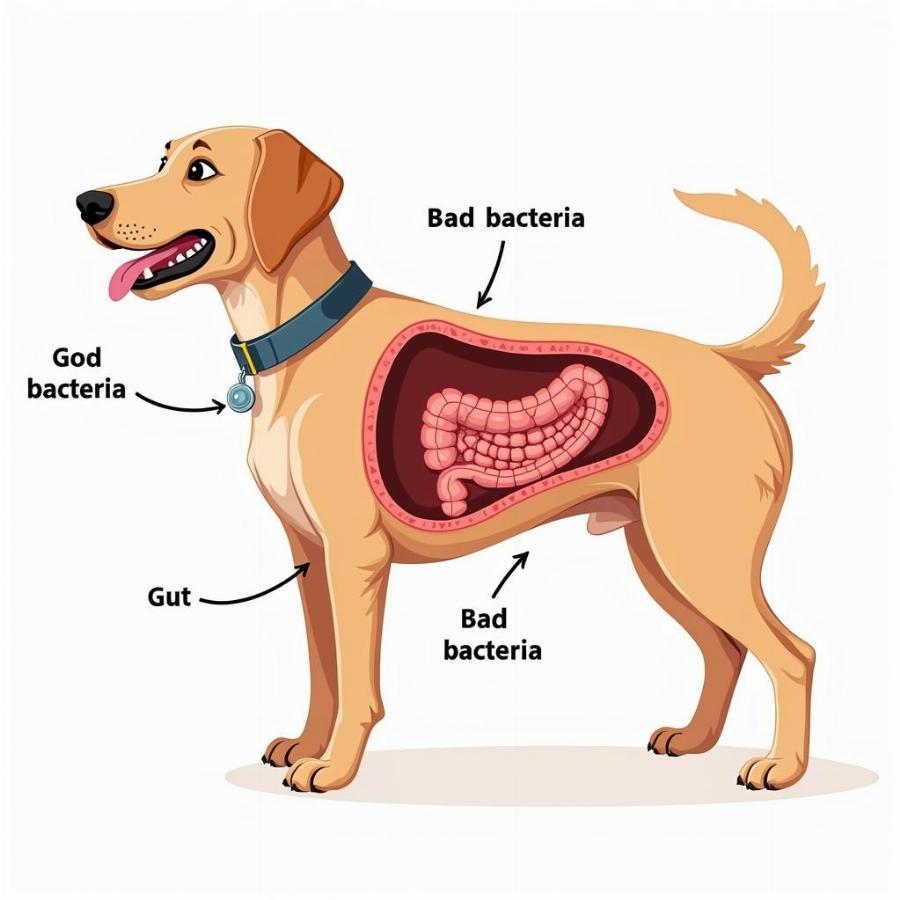Giving your furry friend human probiotics might seem like a simple way to boost their gut health, but it’s not as straightforward as it appears. While both humans and dogs can benefit from probiotics, their digestive systems and gut flora differ significantly. So, the question “can you give dogs human probiotics?” requires a more nuanced answer than a simple yes or no. This article will delve into the complexities of canine probiotics, exploring the potential benefits and risks of using human probiotics for dogs, and providing guidance on how to choose the right probiotic supplement for your canine companion.
Understanding the Canine Gut and Probiotics
 Chó Cảnh và Hệ Tiêu Hóa
Chó Cảnh và Hệ Tiêu Hóa
A dog’s digestive system, while similar to a human’s in some ways, has its own unique set of microorganisms. These bacteria, fungi, and other microbes form a complex ecosystem called the gut flora, which plays a crucial role in digestion, nutrient absorption, and immune system function. Probiotics, live microorganisms that are beneficial to gut health, can help maintain a healthy balance of gut flora. They can be particularly helpful during times of stress, illness, or after antibiotic treatment, which can disrupt the natural gut flora. can dogs have gas x offers more information on managing digestive issues in dogs.
The Risks of Using Human Probiotics for Dogs
While some strains of bacteria are beneficial to both humans and dogs, the specific strains and dosages found in human probiotics are often not appropriate for canines. Giving your dog human probiotics could lead to several issues, including:
- Ineffectiveness: Human probiotic strains may not survive the passage through a dog’s digestive system or colonize effectively in their gut, rendering them useless.
- Digestive Upset: Giving your dog a high dose of human probiotics could disrupt their existing gut flora, potentially leading to diarrhea, vomiting, or other digestive problems.
- Allergic Reactions: Some human probiotics contain ingredients that could trigger allergies in dogs, such as lactose or certain fillers.
Choosing the Right Probiotic for Your Dog
So, can you give dogs human probiotics? The answer is generally no. It’s best to choose a probiotic specifically formulated for dogs. These products contain strains of bacteria that are known to be beneficial for canine gut health and are offered in appropriate dosages. When choosing a probiotic for your dog, look for products that:
- Contain canine-specific strains: Lactobacillus acidophilus, Bifidobacterium animalis, and Enterococcus faecium are a few examples of beneficial strains for dogs.
- List the CFU count: CFU stands for Colony Forming Units, which indicates the number of live bacteria in the product. Choose a product with a high CFU count.
- Are from a reputable brand: Opt for brands that conduct quality control testing and follow good manufacturing practices.
“Choosing a dog-specific probiotic ensures you’re providing your furry friend with the best possible support for their digestive health,” advises Dr. Emily Carter, a veterinary nutritionist with over 15 years of experience. “Always consult with your veterinarian before starting your dog on any new supplement, including probiotics.”
Alternatives to Probiotic Supplements
In addition to commercial probiotic supplements, there are other ways to support your dog’s gut health:
- Prebiotics: Prebiotics are non-digestible fibers that feed the beneficial bacteria in the gut. They can be found in certain fruits, vegetables, and supplements.
- Fermented Foods: Small amounts of plain, unsweetened yogurt or kefir can provide a natural source of probiotics for dogs. However, be cautious with dairy as some dogs are lactose intolerant. best allergy supplements for dogs provides information on managing allergies in dogs.
“Incorporating prebiotic-rich foods into your dog’s diet can create a thriving environment for beneficial gut bacteria,” adds Dr. Carter. “It’s like fertilizing the garden within their digestive system.”
Conclusion
While the idea of sharing your probiotics with your dog might seem appealing, it’s crucial to prioritize their safety and well-being by opting for canine-specific probiotics. Remember to consult your veterinarian before adding any new supplement to your dog’s diet, including probiotics. By understanding the nuances of canine digestion and choosing the right probiotic, you can help your furry companion maintain a healthy and happy gut. dogs pooping calendar 2024 might be a fun and informative read for understanding your dog’s digestive habits.
FAQ
- What are the signs of an unhealthy gut in dogs? Common signs include diarrhea, vomiting, gas, bloating, bad breath, and changes in appetite or stool consistency.
- Can I give my dog yogurt every day? While a small amount of plain, unsweetened yogurt can be beneficial, too much dairy can upset a dog’s stomach. Consult your vet for guidance.
- How long does it take for probiotics to work in dogs? It can take several weeks for probiotics to establish themselves in the gut and produce noticeable benefits.
- Are all dog probiotics the same? No, different probiotics contain different strains and CFU counts, which can affect their efficacy.
- What should I do if my dog has an adverse reaction to a probiotic? Stop giving the probiotic immediately and contact your veterinarian.
- Can probiotics help with dog allergies? Some research suggests that probiotics may help alleviate allergy symptoms in dogs, but more studies are needed. hot dog cheese explores other dietary considerations for dogs.
- Can puppies take probiotics? Yes, there are probiotics specifically formulated for puppies.
Beaut Dogs is your trusted source for all things dog-related. We provide expert advice and comprehensive information to help you navigate the world of canine care. For personalized guidance on probiotics or any other dog-related questions, please contact us at Email: [email protected]. Beaut Dogs is dedicated to helping you keep your canine companion healthy and happy. can dogs drink pop provides further insights into dog health and nutrition.